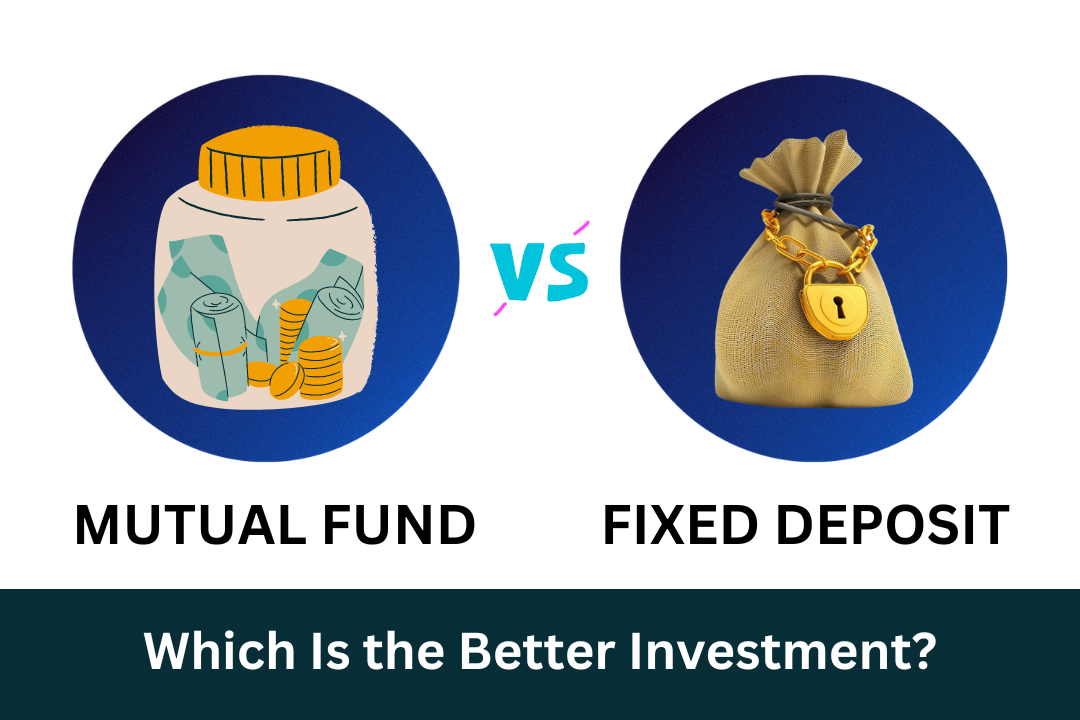Mutual Fund vs Fixed Deposit often emerge as the two most popular choices. Both investment options have their unique advantages and cater to different types of investors. This article delves into the key differences, benefits, and drawbacks of Mutual Funds and Fixed Deposits to help you decide which is the better investment for your financial goals.
Understanding Mutual Funds
A Mutual Fund is a financial instrument that pools money from various investors to invest in a diversified portfolio of stocks, bonds, or other securities. Managed by professional fund managers, mutual funds aim to generate returns for investors based on their risk appetite and investment horizon.

Advantages of Mutual Funds
- Diversification: By investing in a mutual fund, your money is spread across a wide range of assets, reducing the risk associated with any single investment.
- Professional Management: Mutual funds are managed by experienced fund managers who make informed decisions based on market research and analysis.
- Potential for High Returns: While mutual funds come with market risks, they also offer the potential for higher returns, especially in the long term.
- Liquidity: Mutual funds offer high liquidity, meaning you can redeem your investment at any time, though some funds may charge an exit load if withdrawn within a certain period.
Disadvantages of Mutual Funds
- Market Risk: The value of mutual funds can fluctuate based on market conditions, making them a riskier investment compared to fixed deposits.
- Management Fees: Mutual funds charge management fees, which can reduce your overall returns.
- Tax Implications: Depending on the type of mutual fund, capital gains tax may apply, affecting your net returns.
Understanding Fixed Deposits
A Fixed Deposit (FD) is a financial instrument provided by banks and financial institutions, where you can deposit a lump sum amount for a fixed tenure at a predetermined interest rate. FDs are considered one of the safest investment options.
Advantages of Fixed Deposits
- Safety and Security: Fixed deposits are low-risk investments as they are not affected by market fluctuations. The principal amount and interest are guaranteed by the bank.
- Predictable Returns: With fixed deposits, you earn a fixed rate of interest over a specified period, ensuring predictable returns.
- Tax Benefits: Some fixed deposits, such as tax-saving FDs, offer tax deductions under Section 80C of the Income Tax Act, 1961.
- Ease of Investment: Fixed deposits are easy to invest in and require minimal paperwork. They are a preferred choice for conservative investors looking for capital protection.
Disadvantages of Fixed Deposits
- Lower Returns: Compared to mutual funds, the returns on fixed deposits are generally lower. Over time, inflation can erode the real value of the returns.
- Liquidity Constraints: Fixed deposits have a lock-in period, and premature withdrawal may attract penalties, reducing the effective returns.
- Taxable Interest: The interest earned on fixed deposits is fully taxable, which can reduce your net returns.
Tax Implications
Mutual Funds:
- Equity Mutual Funds: Gains are classified as long-term capital gains (LTCG) if held for more than a year and taxed at 10% if they exceed ₹1 lakh. Short-term capital gains (STCG) for holdings less than a year are taxed at 15%.
- Debt Mutual Funds: Gains from debt mutual funds are considered long-term if held for more than three years and taxed at 20% with indexation benefits. Short-term gains are added to your income and taxed according to your income tax slab.
Fixed Deposits:
- Interest Income: The interest earned on fixed deposits is fully taxable and is added to your income, taxed as per your applicable income tax slab. Banks also deduct TDS (Tax Deducted at Source) if the interest exceeds ₹40,000 per annum (₹50,000 for senior citizens).
Which is the Better Investment?
The choice between Mutual Funds and Fixed Deposits depends on your financial goals, risk tolerance, and investment horizon.
- For Conservative Investors: If you prioritize capital preservation and want assured returns with minimal risk, Fixed Deposits are the better choice. They offer security and predictability, making them ideal for short-term goals or as a safe component of a diversified portfolio.
- For Growth-Oriented Investors: If you are willing to accept some level of risk in exchange for the potential for higher returns, Mutual Funds are a suitable option. They are ideal for long-term goals like retirement planning, children’s education, or wealth creation, where the power of compounding can significantly grow your investment over time.
Conclusion
Mutual Funds and Fixed Deposits have their own set of advantages and drawbacks. Your decision should be based on a clear understanding of your financial objectives, time horizon, and risk appetite. A balanced approach could involve diversifying your investments across both options to take advantage of the safety of FDs and the growth potential of mutual funds.
Visit again financestock.in and subscribe for the latest updates llike a ETF vs Mutual Fund: Which Is the Better Investment?

